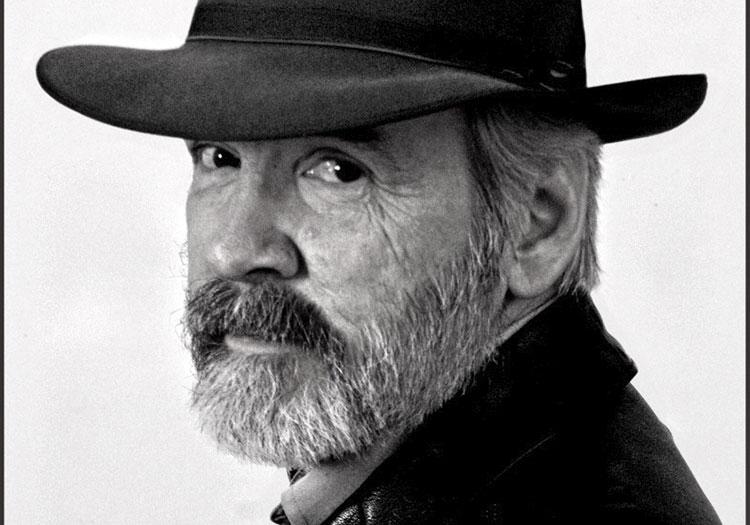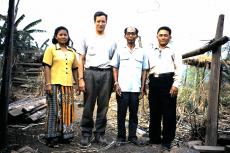Residents of Sag Harbor knew Anthony Brandt as the chairman of its Board of Historic Preservation and Architectural Review, one of the regulatory boards charged with maintaining the authenticity and character of houses and other buildings in the village. A formidable advocate for preservation, he served in the role for seven years beginning in 1986, five years after he first moved to the village, and again from 2016 to 2019.
But Mr. Brandt was well known in the world outside Sag Harbor, too, as a journalist, author, columnist, poet, and editor. He wrote or edited over a dozen books, including “Reality Police: The Experience of Insanity in America,” for which he pretended to be mentally ill for 10 days to expose questionable medical practices in a state-run hospital. He also edited, in 2003, an updated edition of “The Journals of Lewis and Clark” for National Geographic, which sold more than 100,000 copies.
He wrote the “Ethics” column for Esquire magazine, was the book reviewer for Men’s Journal, and wrote articles that appeared in publications including The Atlantic, Connoisseur, Psychology Today, and American Heritage. On the South Fork, he was a columnist for The Sag Harbor Express and one of the editors of the Pushcart Prize anthologies for 18 years.
Later in life he returned to poetry, baring his Buddhist-leaning soul in poems on Facebook that he eventually incorporated into two collections, “The Fast” in 2016 and “The Only Available Word” in 2020. Poetry, he told The Star in 2020, “is beyond explaining. That’s why poets use the idea of having a muse, because they can’t explain it themselves.”
Mr. Brandt died at the Kanas Center for Hospice Care in Quiogue last Thursday, six days after his son, Evan Brandt, a journalist, read him the most recent headlines from The New York Times. “Looks like I am getting out of here just in time,” the younger Mr. Brandt said his father told him. He was 87 — just a week shy of his 88th birthday — and had been in declining health for some time.
Anthony Scott Brandt was born in Cranford, N.J., on Nov. 21, 1936, to Grace Scott Brandt and Axel Hjalmar Brandt. He grew up in nearby Westfield. The family summered on New Jersey’s Long Beach Island, which inspired in him a love of sailing and an appreciation for the thrill of competition. He went on to graduate from Westfield High School and from Princeton University with a degree in English. While at Princeton, he sang double bass in the choir, whose director urged him to pursue an opera career.
He didn’t pursue singing professionally, but would later serenade his second wife, Lorraine Dusky, with the Nat King Cole song “Sweet Lorraine” at their wedding in 1981 and each year on her birthday.
After college, Mr. Brandt and his first wife, Barbara Rescorla, whom he married in 1958, spent six months in Oklahoma while he was enrolled in the Reserve Officers Training Corps. He underwent training to be a forward observer, a dangerous military assignment that typically involves forging ahead of the unit to send back target coordinates for artillery strikes.
“He was very, very good at this,” Ms. Dusky recalled. “Once, when they were giving a demonstration to the higher brass, his commanding officer was very pissed off because Tony hadn’t shaved that morning, but he made a perfect shot. After that, the commanding officer said he wanted to adopt him. He was quite proud of the fact that he could do this, but he was never in battle.”
Mr. Brandt’s first marriage ended in divorce, and after another relationship that followed, he and Ms. Dusky met at a brunch party. They soon decided, all in the span of one weekend in February 1981 that also involved a bar crawl around Sag Harbor, that they would rent a house on Henry Street and get married. This they did in September that year.
A lifelong Democrat who came from a family of Republicans, Mr. Brandt became active in politics after moving to Sag Harbor. He worked on the mayoral campaign of George Butts, who later appointed him chairman of the architectural review board. “Talk of local politics and local issues was always high on the agenda around the dinner table,” Evan Brandt wrote in an online tribute to his father.
His second resignation, in January 2019, from the architectural review board, came amid a controversial proposal for luxury condominiums on West Water Street. His formal resignation letter, which he submitted after he voted “no” on the condos, was eventually released by the village clerk, redacted almost in its entirety. It has since become part of a curriculum to teach journalism students at Stony Brook University about the Freedom of Information Law.
His book “Reality Police” has been studied by law students after it spurred a lengthy legal battle. He was sued for libel by the psychiatrist who had been accused of wrongdoing, a case that dragged on for years with appeals, but after hiring The Kansas City Star’s own libel attorney because the case originated in Kansas, Mr. Brandt emerged victorious but nearly broke from legal fees.
He was a founding board member of Fighting Chance, a Sag Harbor nonprofit that supports cancer patients, and served more than 10 years there in all. He was also on the board of the Whaling Museum in the village for a decade.
Amid all these accomplishments, the one he considered his proudest accomplishment was the writing of a book not yet published. Titled “Streets Paved With Hope: The Rise and Fall of the American Dream,” it’s likely to be published posthumously, Ms. Dusky said.
“We were married for 43 years and for all of those years he wanted to write a book about the American Dream,” Ms. Dusky said. “It was always the big thing in the back of his mind. His agent is trying to sell it now. I think it’s wonderful. It would have been what he thought of as his greatest achievement.”
Mr. Brandt maintained an extensive collection of books, mainly nonfiction. “I had always wanted to marry somebody who had a dictionary stand,” Ms. Dusky recalled. “That would indicate everything, and of course he had one. By then, I also had one.”
In recent years, he enjoyed sitting outside on the backyard deck at home on Lincoln Avenue, watching the birds in the container garden that Ms. Dusky cultivated.
In addition to Ms. Dusky and Evan Brandt, who lives in Pottstown, Pa., he leaves a daughter, Kate Brandt of Montrose, N.Y. He also leaves two grandchildren, Eli Gunther and Dylan Brandt, to whom he dedicated one of the books he edited, “The Tragic History of the Sea: Shipwrecks From the Bible to the Titanic.” His brother, Charles, died in 2003.
Mr. Brandt was cremated. His memorial service is to be private.





